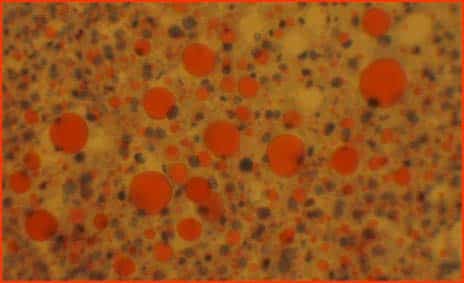
When a person eats, a gland inside, called the pancreas, makes insulin, which keeps blood sugar in check. This is good because only a certain amount of sugar is supposed to be circulating around in a person?s bloodstream. But what if our cells don?t react to insulin like they are supposed to? That is called being insulin-resistant, and it?s a big problem. The poor pancreas tries to make up for what it thinks is a shortage by pumping out more insulin, until it gets tired and gives up. Then, the blood sugar gets off its leash and runs wild. That?s diabetes.
So having enough insulin, along with cells that are able to use it properly, is good. But having too much of it, in the form of ?chronically elevated insulin levels,? is bad. Among other things, it can cause heart disease.
Yesterday, Childhood Obesity News mentioned Dr. Sonia Caprio, who got interested in the connection between insulin resistance and the how some people store up fat in their livers and other places where fat doesn?t belong. Plenty of other scientists are looking into this question too. Scott Grundy, of the University of Texas, believes that most people have a misunderstanding about heart disease. Gary Taubes explains the Grundy point of view:
Heart attacks 50 years ago might have been caused by high cholesterol ? particularly high LDL cholesterol ? but since then we?ve all gotten fatter and more diabetic, and now it?s metabolic syndrome that?s the more conspicuous problem.
Put together a body?s failure to be able to use insulin the way it?s supposed to (insulin resistance) with an apple-shaped figure, and you?ve got metabolic syndrome. But how does it start? What causes insulin resistance? At this point, nobody seems to know. We know fat builds up in the liver, but is that a random connection or part of a cause-and-effect relationship? The answer isn?t clear, and this is one of the things researchers are trying to figure out.
The picture on this page is a microscopic closeup of a mouse?s liver, with the fat cells dyed red so we can see them easily. Those fat cells aren?t supposed to be there. Yuck! Another mystery is, why do both obese and skinny people have fatty livers? And mainly, how do we keep fat from accumulating in our livers?
The answer appears to be: Don?t eat sugar. Scientists discovered that laboratory rats can be made insulin-resistant by feeding them lots of fructose:
Feed animals enough pure fructose or enough sugar, and their livers convert the fructose into fat ? the saturated fatty acid, palmitate, to be precise, that supposedly gives us heart disease when we eat it, by raising LDL cholesterol. The fat accumulates in the liver, and insulin resistance and metabolic syndrome follow.
Michael Pagliassotti of Colorado State University found that insulin resistance and fatty liver in lab animals could be reversed by taking the fructose out of their diet.
Unfortunately, up until recently, the only parallel research in humans was done with pure fructose, which is different from high-fructose corn syrup (HFCS) or table sugar. To break the pattern, a study by Havel and Stanhope (University of California) fed people sugar and HFCS. The results from the testing they and other researchers did, led to a backlash. The public started to turn against high-fructose corn syrup, for good reason.
Jonathan Bailor writes:
To use the example of a clogged drain, think of eating high-fructose corn syrup as pouring quick-drying cement down your drain? Beyond leaving us hungry, clogged, and overweight, high-fructose corn syrup makes other food fill us up less? It leaves us hungrier than if we did not eat it. It alters our baseline levels of Satiety hormones and drives us to eat more and more over time.
And then, just to tie everything up in a neat bow, the stuff that causes insulin resistance is also addictive.
Your responses and feedback are welcome!
Source: ?Is Sugar Toxic?,? The New York Times, 04/13/11
Source: ?In A Decade It Will Be Illegal, Today It?s In Everything ? High-Fructose Corn Syrup,? The Smarter Science of Slim, 08/15/12
Image by Pazit Polak.
Source: http://childhoodobesitynews.com/2012/11/07/a-few-things-about-insulin/
mario williams vcu unlv sam young ncaa bracket ramon sessions portland trail blazers
No comments:
Post a Comment
Note: Only a member of this blog may post a comment.